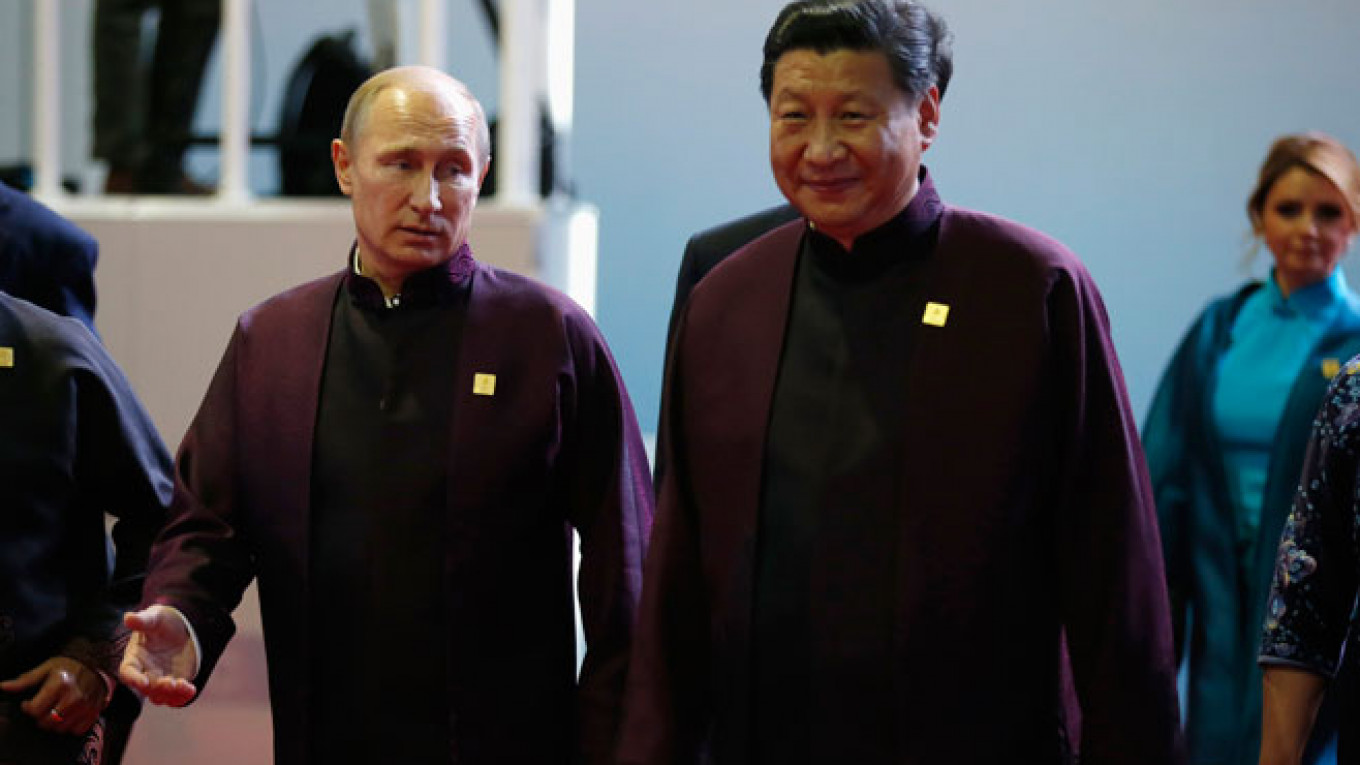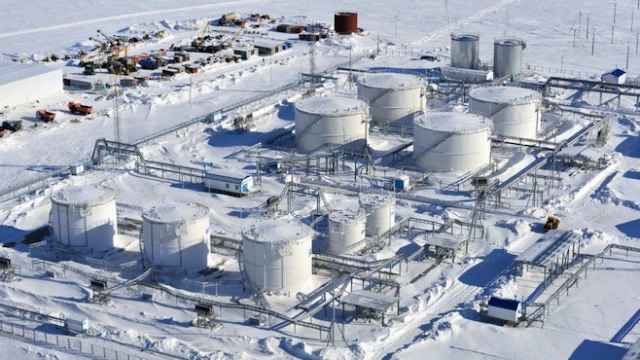Speaking at the Asia-Pacific Economic Cooperation forum on Monday, President Vladimir Putin vowed that Russia would develop all forms of trade with China, not just hydrocarbon exports.
But the second-largest natural gas deal this year signed the previous day with Russia's Gazprom suggests China is more interested in Russia's energy than its trade — especially now that Western sanctions on Russia have made Moscow eager for new allies.
"We are taking concrete steps to broaden the scope of our exports [to the Asia-Pacific region] and increase the share of non-resource and high-technology products," Putin said at the forum, according to a transcript on the Kremlin's website.
Over a quarter of Russia's trade turnover is currently with countries in the Asia-Pacific region and the goal, Putin said, is to increase this figure to 40 percent in the near future.
However, despite the trumpeted efforts to diversify trade, it seems that it will be natural gas, one of Russia's traditional export resources, that will constitute the lion's share of this planned increase, if a raft of recently announced projects are completed.
On Sunday Gazprom and China National Petroleum Corporation signed a framework agreement to supply an additional 30 billion cubic meters of gas per year via the so-called "western" route, which envisages gas flows from western Siberia south to China through a yet-to-be-built Altai pipeline.
Combined with the previously reached agreements and future plans, Russia's natural gas supplies to China may surpass those directed to Europe, Gazprom head Alexei Miller said after the deal was clinched, Interfax reported.
In May Gazprom and CNPC signed a $400 billion deal to supply 38 billion cubic meters of gas per year for the next 30 years from eastern Siberia to northeastern China through the 4,000-kilometer Power of Siberia pipeline which is now under construction. The cost of building the pipeline and all supplementary infrastructure varies from the $55 billion earlier voiced by Miller to $100 billion according to expert estimates.
The contract was presented as a big diplomatic win for Russia as relations with the West rapidly deteriorated over the crisis in Ukraine. Combined with the second agreement, the victory over Europe may seem total — but experts were doubtful the winner in this case was Russia.
"After building a $100 billion pipeline Gazprom will have to ensure it is not standing idle, and this is where China comes in," said Mikhail Krutikhin, a partner and analyst at the Russia-based RusEnergy consulting company.
After investing so much money and time, Gazprom will be desperate to sell its gas through the pipeline, which means that China, currently not dependent on Russia for its gas supplies, could renegotiate a very attractive price. Gazprom would thus have to sell its gas only notch above the cost if not below it, the expert concluded.
In the recent years China has made efforts to diversify its gas supplies. According to BP's "Energy Outlook 2035" report, in the next decade China will be dependent on imported pipeline gas for less than a third of its overall consumption while liquefied natural gas imports and domestic production will continue to grow.
Sergei Pikin, director of Moscow-based think tank the Energy Development Fund, agreed with Krutikhin. "The profit margin for the Chinese contracts would be close to zero," he said.
Besides political gains, Russia was also hoping for financial aid from China to shoulder the expensive task of constructing the Power of Siberia. Under the preliminary plan Gazprom was to receive a 770 billion ruble ($17 billion) prepayment from CNPC. But this agreement was called off on Sunday as "unnecessary."
"Because we have reached the final agreement on the price, we are no longer considering negotiating for prepayment as an instrument to further decrease price," Miller said according to Interfax, not disclosing, however, the actual price of the contract.
Gazprom is now considering taking out loans in Chinese banks although no concrete agreements have so far been reached, the executive said.
At 2,600 kilometers, the newly proposed Altai pipeline of the "western" route to China would run a shorter distance through Russia than the Power of Siberia and should be cheaper to build. But it would still need to cover a large and undeveloped territory in China, Krutikhin said.
"Over 8,000 kilometers of pipelines will have to be built on total to reach industrially developed regions in eastern China because the territory on the pipeline's entrance to the country resembles a desert," Krutikhin said.
Besides, there are other gas suppliers in the region, which means Russia will have to offer a very competitive price to enter this market after having invested heavily in pipeline infrastructure, the expert said.
"There are already three and soon will be four gas pipelines entering China at its western border, which at full capacity will transport up to 95 billion cubic meters per year from Central Asia," Krutikhin said.
Contact the author at [email protected]
A Message from The Moscow Times:
Dear readers,
We are facing unprecedented challenges. Russia's Prosecutor General's Office has designated The Moscow Times as an "undesirable" organization, criminalizing our work and putting our staff at risk of prosecution. This follows our earlier unjust labeling as a "foreign agent."
These actions are direct attempts to silence independent journalism in Russia. The authorities claim our work "discredits the decisions of the Russian leadership." We see things differently: we strive to provide accurate, unbiased reporting on Russia.
We, the journalists of The Moscow Times, refuse to be silenced. But to continue our work, we need your help.
Your support, no matter how small, makes a world of difference. If you can, please support us monthly starting from just $2. It's quick to set up, and every contribution makes a significant impact.
By supporting The Moscow Times, you're defending open, independent journalism in the face of repression. Thank you for standing with us.
Remind me later.






